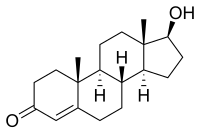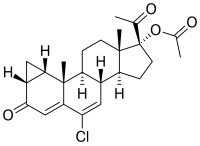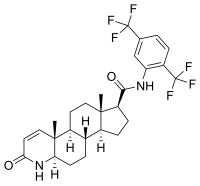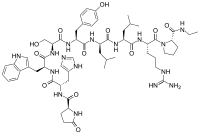List of antiandrogens
This article needs additional citations for verification. (April 2022) |

This is a list of antiandrogens,[1] or drugs that prevent the effects of androgens like testosterone and dihydrotestosterone (DHT).[2] It includes direct antagonists of the androgen receptor (AR), androgen synthesis inhibitors like 5α-reductase inhibitors and CYP17A1 inhibitors, and antigonadotropins like GnRH analogues, estrogens, and progestogens.[3] In addition, it includes both steroidal antiandrogen (SAAs) and nonsteroidal antiandrogen (NSAAs).
Androgen receptor antagonists
[edit]Steroidal antiandrogens
[edit]
- 17α-Hydroxyprogesterone derivatives
- 19-Norprogesterone derivatives
- 19-Nortestosterone derivatives
- 17α-Spirolactone derivatives
- Others
Note that in addition to acting as AR antagonists, most SAAs also act as potent progestogens and therefore antigonadotropins.
Note that this list does not include pure progestogens, only SAAs also acting as AR antagonists.
Nonsteroidal antiandrogens
[edit]
- First-generation
- Second-generation
- Others/non-generational
Note that, in contrast to most SAAs, NSAAs are pure/selective AR antagonists with no antigonadotropic activity.
Androgen synthesis inhibitors
[edit]CYP17A1 inhibitors
[edit]
CYP11A1 (P450scc) inhibitors
[edit]5α-Reductase inhibitors
[edit]
These drugs selectively inhibit the synthesis of DHT without affecting that of testosterone.
Antigonadotropins
[edit]
- Estrogens (e.g., estradiol (and its esters), ethinylestradiol, conjugated estrogens, diethylstilbestrol)
- GnRH analogues
- GnRH agonists (e.g., goserelin, leuprorelin)
- GnRH antagonists (e.g., cetrorelix)
- Progestogens (e.g., chlormadinone acetate, cyproterone acetate, gestonorone caproate, medroxyprogesterone acetate, megestrol acetate)
See also
[edit]References
[edit]- ^ "List of Antiandrogens (androgen antagonists)". Drugs.com. Retrieved 2022-03-27.
- ^ "antiandrogen | drug | Britannica". www.britannica.com. Retrieved 2022-03-27.
- ^ "Antiandrogen - an overview | ScienceDirect Topics". www.sciencedirect.com. Retrieved 2022-03-27.
